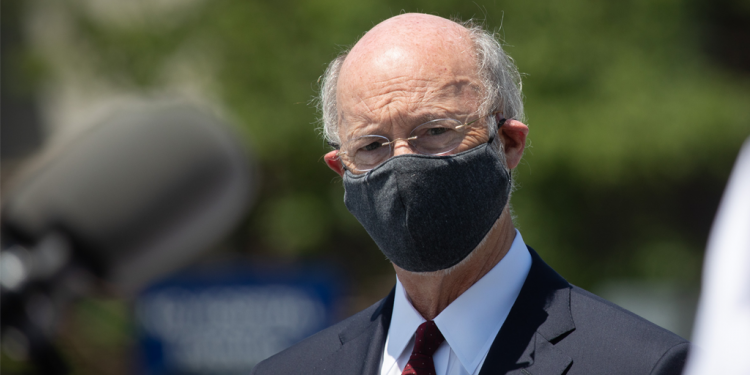by Angela Couloumbis of Spotlight PA and Cynthia Fernandez of Spotlight PA
Spotlight PA is an independent, non-partisan newsroom powered by The Philadelphia Inquirer in partnership with PennLive/The Patriot-News, TribLIVE/Pittsburgh Tribune-Review, and WITF Public Media.
HARRISBURG — In one of his boldest budget proposals since taking office, Democratic Gov. Tom Wolf is asking the legislature to significantly boost funding for public schools, legalize recreational cannabis, and approve the first major tax increase in nearly two decades.
But Wolf’s $40 billion spending plan, which he formally unveiled Wednesday, is likely to be dead-on-arrival in the GOP-controlled legislature, whose leaders wasted little time shredding it with criticism, calling it unrealistic and hurtful to taxpayers.
“The budget he is presenting is completely unsustainable, totally irresponsible, and absolutely crippling to the state’s economy,” said Jake Corman of Centre County, the Senate’s top Republican. “Now is not the time to ask Pennsylvanians to send more of their hard-earned dollars to Harrisburg.”
Still, the Democratic governor, who in recent years has avoided goading Republican leaders with aggressive spending proposals, said he believes his budget blueprint will make the state’s education system fairer and its tax structure more equitable for Pennsylvanians reeling from the financial blows of the pandemic.
“It’s perhaps the only time in the last century that a governor has not made the annual budget address in person, in the Capitol,” said Wolf, who delivered his budget address remotely in a pre-taped video. “Instead, today I am talking to you directly — all of my fellow Pennsylvanians. And maybe this is the way it ought to be done.”
He said his focus was on helping new families and “the obstacles that might be getting in the way of their hopes and dreams, the burdens that kept them up at night.”
Wolf’s seventh budget proposal harks back to several of his long-held priorities — a throwback to progressive reforms he and other Democrats have sought for years.
The governor’s plan would boost funding for public schools by $1.35 billion, some of which would be dispersed to school districts through the state’s fair-funding formula, which is set up to help schools that serve disproportionately poor and fast-growing districts.
“No matter how great a parent you are, if your local school system lacks the resources it needs to provide your kids with a quality education, that’s a barrier to giving them a better life. A barrier so big, it actually blocks out the sun,” Wolf said.
He would pay for the increase by raising the state’s personal income tax rate, which currently is 3.07%, to 4.49%. However, the Wolf administration said only the top one-third of earners would pay more, because the proposal expands exemptions and tax forgiveness.
The proposal would increase the allowances for tax forgiveness to $15,000 for single filers and $30,000 for married filers, while providing a $10,000 allowance for each dependent.
“I want to help working families get ahead by reducing their taxes. This isn’t about pitting the rich against the poor and the middle class,” Wolf said. “That’s the thing about financial security. Most people who have it had to earn it. And if you’re one of those people, think back to the early days, when you were just starting out, when you hadn’t yet overcome the barriers that stood between you and your success.”
Pennsylvanians with incomes at or below these thresholds would receive 100% tax forgiveness. The percentage of tax forgiveness declines by a percentage point for each $500 above the threshold for 100% forgiveness. That means that families with two children making less than $84,000 will receive a tax cut while a family of four making $50,000 will have their taxes eliminated, the administration said.
In addition, Wolf’s budget proposal would legalize recreational cannabis. He said he wants to use the money to “support historically disadvantaged small businesses through grant funding and provide them the assistance they need to build back from the economic crisis and strengthen our economy.”
A portion of the revenue would support programs to help individuals and communities that have been adversely harmed by the criminalization of marijuana.
This story will be updated.




